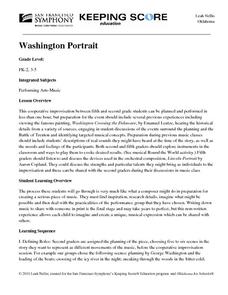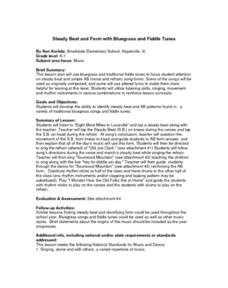Curated OER
Mapas Bailados: Creating Visual Representations of Dances Using Maps
Third graders listen to "Frank the Monster..." and discuss the dance map on the inside cover of the book. They create their own dance map using sentence strips to record the types of movement.
Curated OER
Sharp and Smooth Movements: The Nutcracker
Students explore sharp and smooth movements. In two groups, students perform dances using sharp and smooth movements. They are asked to discuss the differences between the movements and how they felt when you watched or performed.
Curated OER
-Body in Motion - Axial and Locomotor
Learners practice increasing their movement and dance vocabulary through axial motion and locomotor step skill-building. They work with a partner and create and perform short sequences utilizing the vocabulary their practicing. Each...
Curated OER
Using the Patterns and Symbols of Mali Mud Cloth to Convey Identity
Students participate in relating the role of the arts in defining identity. They examine the community in West African society and how members of that community define their role. They view how artifacts, music and performance can...
Curated OER
The Water Cycle: Revising the Drafts
Students explore states of matter by concentrating on the ways in which water moves between its solid, liquid, and gaseous states in a variety of Earth environments familiar to the students. Students represent these movements in dance.
Curated OER
Twister Moves
Middle schoolers play the game Twister Moves with their classmates. It's a nonelectric dance machine that they move on after being given certain directions. The moves are taken to the background of a variety of 50 tracks on a CD.
Curated OER
Our Family and Age
Start by playing a song about numbers. "Sing, Dance, Laugh, and Eat Quiche" is suggested. Then, start counting things around the room. Introduce yourself, and have kids start to introduce themselves when they catch on to the vocabulary....
VH1
Lesson 3: Marketing of Pop Music
Pop music and marketing are thrown into the mix to make a fun and engaging lesson. Learners listen to several pop songs and discuss the differences in musical style. They then get into groups and work together to decide how they are...
San Francisco Symphony
Washington Portrait
Fifth and second graders pair up to create mini dance scenes based on the image Washington Crossing the Delaware. Second graders create the movements while their fifth grade partners play the musical accompaniment. Leadership skills,...
Curated OER
Water Fitness
Toward the end of the school year when the weather warms up, take your high schoolers swimming! They perform various cardiovascular activities in the pool, beginning with a warm-up activity and followed by stretching, precardio,...
International Technology Education Association
Tidy Up Those Sloppy Force Fields!
It is just magnetic. This resource presents the concept of Earth's and another planet's magnetic field and how spacecrafts detect them. Learners study a problem using magnetometers and participate in three experiments to come up with a...
Curated OER
Beyond the Notes
Students observe as the teacher introduced themself as a talent scout for a clothing company for teenagers who is looking for a choreographer for a commercial for a new line of clothes called, "The Wrap". They work alone or in groups of...
Curated OER
Kye Kye Kule
Third graders study the repeating patterns and basic dance movements used in traditional African drumming songs. In groups, they create a story that can be used with a ritual/tradition and a rhythmic piece that uses repeating rhythmic...
Curated OER
Accelerando - Israel, Peru, Russia
Students complete activities to learn about the music concept of accelerando. In this accelerando lesson, students sing songs and learn tempo. Students use the Yiddish circle dance 'Bim Bam' to complete a circle dance. Students also...
Curated OER
Emotions in Motion
Young scholars use dance as a form of communication. In this meanings of dance lesson, students create dances to communicate a variety of emotions.
Curated OER
Moving and Grooving with Tempo
Students participate in activities involving folk music using movement to illustrate the musical concept of tempo. The use of a game is used in order to help maintain student involvement in the activity.
Curated OER
"Nutcracker"
Students recognize the timbre of a celesta by listening to music that contains the celesta. They listen to music from Tchaikovsky's "Danse de la Fee-Dragee" (Dance of the Sugar-Plum Fairies), track #14 and describe how the music...
Curated OER
Creating Characters: Movement
Students compare two characters and role-play how they would perform various actions. They view and discuss a video, list opposite descriptions for the two girls in the video, and role-play the opposites.
Curated OER
Haydn 's Surprise
Students explore the background of Haydn's Surprise and the texture of the music. The teacher uses mouse and lion puppets to demonstrate soft and loud music. They tiptoe and stomp to display the concept. and play a soft/loud singing game.
Curated OER
Steady Beat and Form with Bluegrass and Fiddle Tunes
Students utilize listening skills, singing, movement and rhythm instruments in various combinations to reinforce lesson concepts. They develop the ability to identify a steady beat and AB patterns found in a variety of traditional...
Curated OER
Inexpensive Marrionette Puppet
Learners follow directions to create a marionette puppet using Styrofoam balls, fishing line and feathers. They practice making it walk, dance, eat, sit, and walk backwards.
Curated OER
Technicolors
Students use a variety of computer games and programs to reinforce colors. In this colors lesson plan, students create scenes, view degrees of colors, see colors dance to music, and more.
Curated OER
Round Dance
Third graders will participate in a dance activity for physical fitness. The learn a social dance that has an origin with the Canadian Aboriginal People. The use of tribal music will make the lesson more culturally relevant.
Curated OER
"Land of 1,000 Dances!"
Third graders distinguish between changes in pitch. They interpret and analyze different pitches being sounded at the same time. Students recognize and analyze a different style from a different ensemble. They listen to different melodies.

























